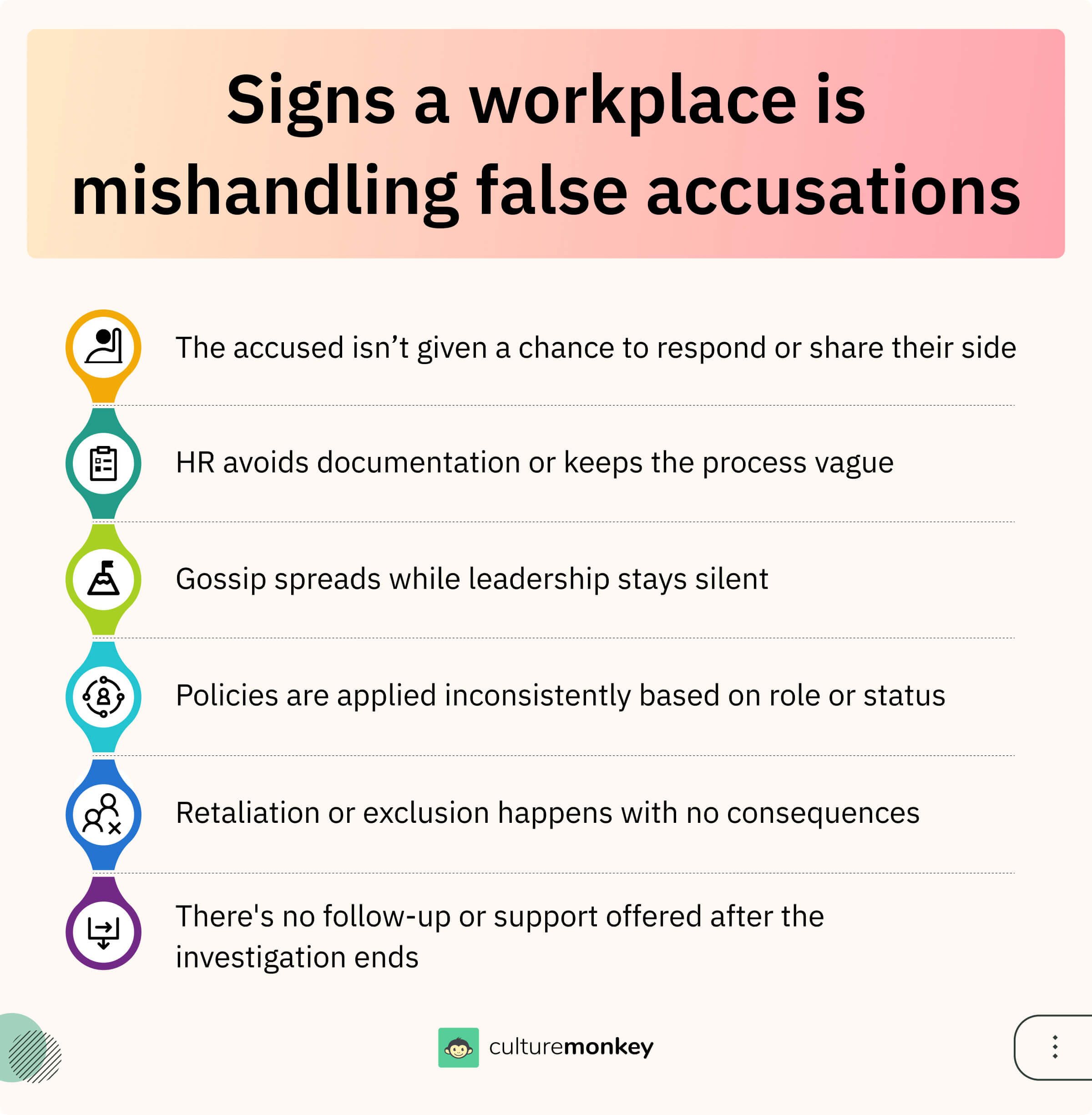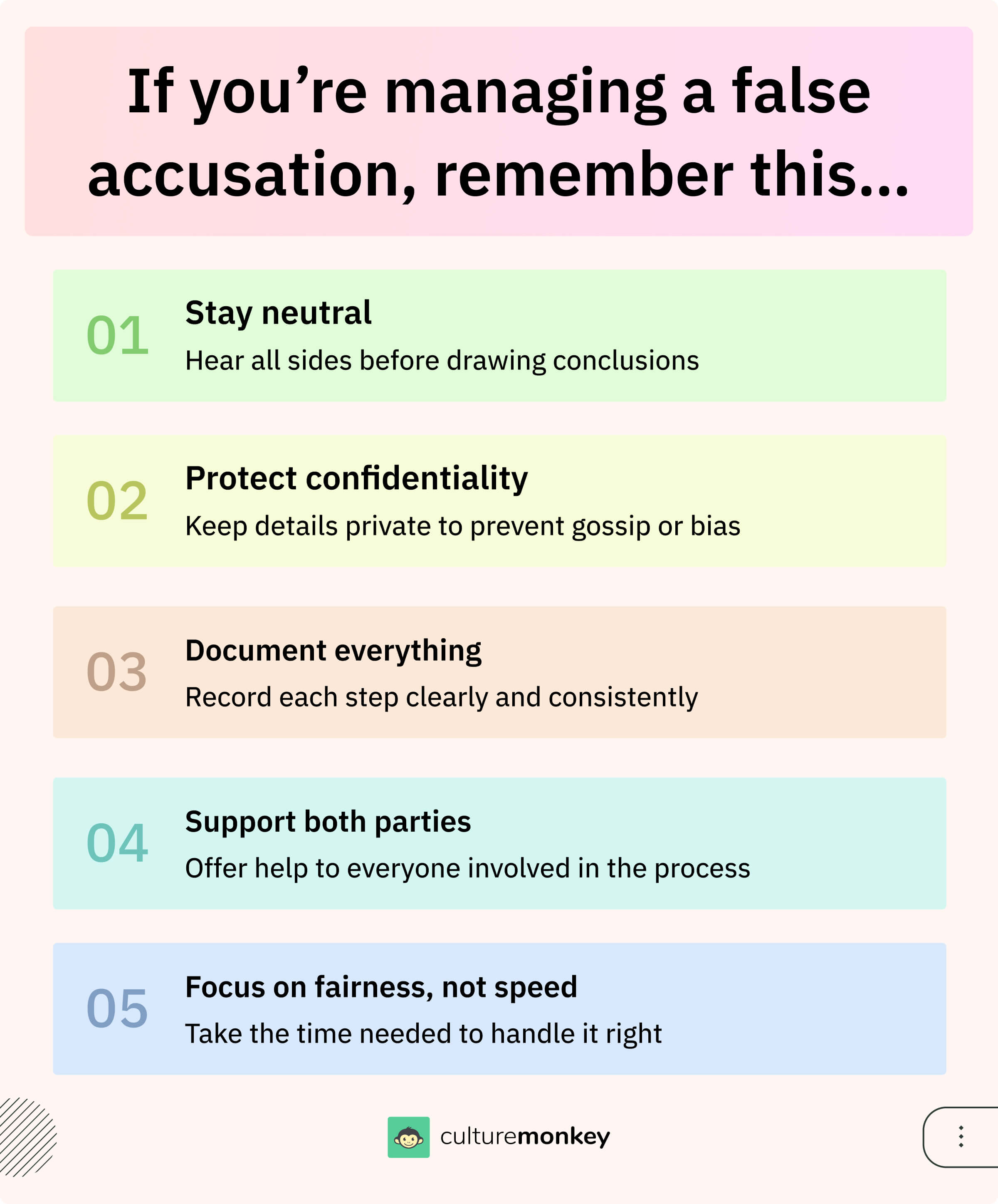False accusations at work: How HR can protect both people and policy

You know the scene. You're eight years old. The cookie jar’s mysteriously empty, and there’s your younger sibling—eyes wide, cheeks suspiciously puffed, and crumbs decorating their chin like confetti. Before you can say a word, their tiny fingers point straight at you.
You protest, heart racing. “I was at soccer practice!” But your mom’s already wearing the classic I’m-not-mad-just-disappointed expression. You're grounded. No cookies. No cartoons. Just cold, crumb-free injustice. The worst part? The real cookie thief gets away scot-free, full of sugar and zero remorse.
Fast forward to today—only now, the stakes are higher. False accusations at work don’t just cost someone a snack break. They can damage reputations, disrupt careers, and shake the foundation of team trust.
For employers and HR leaders, resolving these claims fairly takes more than intuition. It takes process, precision, and empathy. Let’s explore how to handle it—before crumbs become crises.
Think of it this way: resolving workplace accusations is like tightening bolts on a bridge; one loose screw can shake the whole structure.
TL;DR
What are false accusations at work?
TL;DR
False accusations at work are untrue claims of misconduct that damage reputations, morale, and trust. They create ripple effects across teams, sometimes leading to unfair dismissal.
HR must investigate thoroughly, support employees, and act with sensitivity to restore fairness and stability.
The false accusations are untrue claims made against an employee, suggesting they engaged in misconduct or unethical behavior (such as harassment, misbehavior, or theft) they did not commit. These can range from accusations of theft or fraud to inappropriate behavior or policy violations. The impact of such accusations can be profound, affecting the accused’s reputation, morale, and overall workplace dynamics.
It can also result in unfair dismissal. When someone is falsely accused, it creates a ripple effect throughout the organization. Trust can be eroded, not just between the accused and their accuser, but also within the broader team. Employees may become more guarded, communication can break down, and productivity may suffer.
For HR leaders, addressing false accusations requires a careful and thorough investigation to uncover the truth, support the falsely accused, and maintain a fair and just work environment. It’s essential to handle these situations with sensitivity and discretion to prevent further harm and restore a sense of stability and trust within the workplace.
Next, you might wonder how these accusations impact team trust and organizational culture—that’s where HR’s role becomes critical.
Why do employees make false accusations and harassment claims?

While the topic is sensitive, it’s important to understand that not all false claims come from malice—sometimes, they’re rooted in fear, confusion, or unmet emotional needs. By unpacking the reasons behind these situations, we can respond with greater clarity, fairness, and care.
Put differently, false claims don’t always stem from ill intent—they can also arise from simple misunderstandings or emotional triggers.
- Personal vendettas: Sometimes, employees hold grudges against colleagues or supervisors. These grudges can stem from perceived slights, disagreements, or competition. In such cases, false accusations may be used as a tool for revenge or to undermine the target’s credibility.
- Miscommunication and misunderstandings: The workplace is a melting pot of diverse personalities and communication styles. Misunderstandings can easily arise, leading an employee to misinterpret an innocent action or comment as harassment or misconduct. These situations can escalate into false claims if not addressed promptly and effectively.
- Desire for attention or sympathy: Some employees may feel neglected or undervalued in their roles. Making a false allegation can be a way to garner attention, sympathy, or support from colleagues and management. This behavior is often a sign of deeper issues related to self-esteem or job satisfaction.
- Fear of job security: In competitive work environments, employees may feel threatened by the success or performance of their peers. To eliminate perceived threats, they might resort to false accusations to tarnish the reputation of a colleague, thus securing their own position within the company.
- Influence of workplace culture: A toxic or overly competitive workplace culture can foster an environment where false accusations are more likely. If employees see that making accusations leads to swift action or attention from management, they might be more inclined to use this tactic for personal gain.
- Mental health issues: Employees suffering from stress, anxiety, or other mental health challenges may perceive situations inaccurately, leading to making false allegations. These individuals might genuinely believe their accusations, even if they are unfounded, due to their mental state.
- Seeking financial gain: In some instances, employees might make false harassment claims with the hope to seek compensation and file workers compensation claims or by filing a defamation suit. This can be particularly tempting in cases where the company has a history of settling such disputes quickly to avoid bad publicity.
What if employees are just exaggerating instead of lying?
Sometimes, what looks like a false claim may actually be an exaggeration born from miscommunication or heightened emotions. The difference is intent: exaggeration can stem from misunderstanding, while deliberate falsehood aims to harm. HR’s role is to carefully separate perception issues from malicious intent through fair investigation.
Types of false accusations at work
In real workplaces, false allegations at work come in many forms, and each one can carry emotional, professional, and legal consequences.
False accusations at work are like weeds: different shapes, but the same effect of spreading quickly and harming the culture if not addressed.



A lie can travel halfway around the world while the truth is putting on its shoes.
- False harassment or misconduct claims: One of the most damaging types, especially when rooted in personal conflicts or misunderstandings. These often trigger investigations and can lead to the serious psychological effects of false accusations at work, even if the claim is disproven.
- Employee making false accusations against a manager: These can stem from disagreements, performance reviews, or personal bias. When a power dynamic is involved, claims of abuse or favoritism—though unfounded—can put leadership under intense scrutiny.
- Employee making false accusations against a co-worker: Often seen in competitive or tense environments. These may arise from jealousy, rivalry, or attempts to shift blame. Regardless of motive, the accused may suffer reputational damage and workplace isolation.
- Anonymous false accusations at work: These are particularly challenging to investigate, as the lack of transparency can make it difficult to validate claims. Yet, the impact on the accused is just as real.
- Falsified performance complaints: Sometimes used to stall promotions or discredit someone’s contributions. These often lack documented evidence but can still influence perceptions.
- Personal behavior mischaracterizations: Even harmless actions can be twisted when intent is misunderstood. The best way to respond to unfounded allegations at work is calmly, with facts and support from HR.
So the question becomes: how do these different types of accusations ripple out into wider workplace consequences?
Effects of false accusations at work

Bottom line: false accusations at work don’t just hurt reputations—they shake entire teams and damage trust across the workplace.
TL;DR
False accusations at work don’t just harm reputations—they cause lasting psychological stress, workplace tension, and team breakdowns. The accused often struggles with anxiety, self-doubt, and social isolation, while colleagues face declining morale and strained collaboration.
Organizations also pay the price. Legal risks, reduced productivity, and damaged trust in leadership can ripple across the company, eroding engagement, loyalty, and long-term cultural stability.
- Damage to the accused’s reputation: When an employee is falsely accused, their professional reputation can suffer greatly. Even if the accusations are eventually disproven, the lingering doubts and gossip can tarnish their image and hinder future career opportunities.
- Emotional and psychological impact: Being falsely accused and to handle false accusations can lead to significant stress, anxiety, and other mental health issues for the accused. The emotional toll can affect their personal and professional life, leading to decreased job satisfaction and increased absenteeism.
- Decline in team morale: False accusations can create a climate of mistrust and fear among employees. Team members may become wary of one another, leading to a breakdown in communication and collaboration. This erosion of trust can significantly diminish team morale and productivity.
- Increased workplace tension: The atmosphere in the workplace can become tense and hostile following false accusations. Colleagues may take sides, and conflicts can arise, further disrupting the work environment and making it difficult for employees to focus on their tasks.
- Impact on the accuser: While the accused faces immediate consequences, the accuser can also suffer if the falsehood is revealed. They may face disciplinary action, loss of credibility, and strained relationships with colleagues, making it challenging to maintain their position within the company.
- Legal and financial ramifications: Companies may face legal challenges if false accusations lead to wrongful termination or other unjust actions as the affected employees are highly likely to file a lawsuit for a defamation claim. Legal battles can be costly, time-consuming, and damaging to the company’s reputation. The financial resources spent on investigations and fees of the legal professional can strain the organization’s budget.
- Reduced productivity: The time and resources spent investigating false accusations can divert attention from essential business operations. Managers and HR professionals may need to invest significant effort into resolving the issue, detracting from their ability to focus on strategic initiatives and overall productivity.



It takes 20 years to build a reputation and five minutes to ruin it.
- Loss of trust in management: If employees perceive that management is not handling false allegations effectively or fairly, it can lead to a loss of trust in leadership. This erosion of trust can result in lower employee engagement, decreased loyalty, and higher turnover rates.
How to address false accusations at work?
Being accused of something you didn’t do at work can feel like the ground’s been pulled from under you. For leaders, knowing how to respond fairly—without bias or panic—is just as hard. Here’s the kicker: addressing false allegations isn’t just about policy; it’s about protecting people and trust.

- Establish a clear policy: Start by ensuring that your company has a clear, written policy regarding how to handle accusations of any kind. This policy ie. company's disciplinary process should outline the procedures for reporting, investigating, and resolving accusations, emphasizing fairness and confidentiality.
- Take accusations seriously: Regardless of whether the accusation appears credible or seems like an untrue claim, take every claim seriously. This demonstrates to employees that the organization values their concerns and is committed to a fair and just workplace.
- Conduct a thorough investigation: Launch a comprehensive investigation to gather all relevant facts and to identify what the evidence suggests. This involves investigating the accuser's story, interviewing all parties involved, gathering evidence, and consulting relevant witnesses. Ensure that the investigation is impartial and free from biases.
- Maintain confidentiality: To protect the privacy of both the accused and the accuser, keep the details of the investigation confidential. This helps prevent gossip, protects reputations, and ensures a fair process.
- Provide support to the accused: Recognize that being falsely accused can be extremely stressful. Offer support to the accused employee, such as counseling services or temporary adjustments to their work environment, to help them cope with the situation.
- Communicate transparently: Keep all parties informed about the progress of the investigation without compromising confidentiality. Clear communication helps manage expectations and reduces anxiety among employees.
- Make a fair decision: Based on the findings of the investigation, make a fair and objective decision. If the accusation is proven false, take steps to clear the accused employee’s name and restore their reputation within the organization.
- Take corrective action: If the false accusation was made maliciously, consider appropriate disciplinary action or legal action against the accuser. This helps deter future false claims and underscores the importance of integrity within the workplace.
- Review and improve policies: After resolving the incident, review the case to identify any gaps or weaknesses in your existing employment laws and procedures. Use this opportunity to improve your approach to handling accusations, ensuring a more robust and fair process in the future.
Common mistakes to avoid when someone is falsely accused at work
When someone is falsely accused, how you react can either protect trust or unravel it further.
- Dismissing the accusation too quickly: Even if the claim seems baseless, brushing it off without investigation can be a mistake. The first step in how to respond to false allegations at work is to take every claim seriously and follow protocol.
- Assuming intent before facts: Don’t speculate on motive. Whether it’s false harassment claims in the workplace or performance-related allegations, let the investigation uncover the truth—bias will only cloud judgment.
- Failing to document everything: In situations involving false accusations in workplace settings, every detail matters. Skipping documentation makes it harder to defend decisions or support the wrongly accused.
- Leaving the accused unsupported: Someone who’s been falsely accused at work often faces isolation and stress. HR should provide emotional support and clarify employee rights when accused of harassment or misconduct.
- Avoiding communication with the accuser: Knowing what to do when an employee makes false accusations includes staying neutral. Avoid confrontation but maintain communication to keep the process transparent.
- Delaying action or updates: When people don’t know how to deal with false allegations at work, silence can make things worse. Keeping all parties informed builds trust and fairness.
But what happens if HR overlooks these mistakes repeatedly? The risk is a lasting culture of mistrust that’s much harder to repair.
How to report false accusations at work to the HR?
False accusations at work can blindside you, but how you respond makes all the difference. Here’s how to approach HR with clarity, calm, and your facts straight.
TL;DR
Facing false accusations is stressful, but reporting them effectively to HR can protect your reputation and rights. Start by reviewing company policy, documenting every detail, and preparing your case with evidence.
Approach HR calmly, communicate clearly, and request a fair investigation. Follow up in writing, express the impact, and maintain professionalism throughout the process to ensure credibility and resolution.
- Understand the accusation: Gather any relevant information or evidence that disproves the claim, as this will be essential during your discussion with HR. Familiarize yourself with relevant legal protections, such as the Public Interest Disclosure Act, which may provide additional support in your situation.
- Review company policy: Knowing the official procedures and guidelines will help you navigate the process more effectively and ensure that you are following the correct steps. Refer to your employment contract to understand any clauses or provisions related to false accusations and reporting protocols.
- Document everything: Keep a detailed record of all interactions related to the false allegation. This includes emails, messages, notes from meetings, and any other relevant documentation. Having a comprehensive record will support your case and provide a clear timeline of events.
- Schedule a meeting with HR: Request a formal meeting with an HR representative to discuss the false allegation. Be sure to choose a time when you can speak privately and without interruptions. Clearly state the purpose of the meeting in your request.
- Prepare your case: Before the meeting, organize your thoughts and gather all necessary documents. Outline the key points you want to discuss, including why the accusation is false, the impact it has had on you, and any supporting evidence you have.
- Communicate clearly and calmly: During the meeting, explain the situation to the HR representative in a clear and composed manner. Avoid becoming emotional or confrontational, as this can detract from the credibility of your report. Stick to the facts and present your evidence logically.
- Express the impact: Describe how the false allegations has affected you personally and professionally. This can help HR understand the gravity of the situation and the need for a thorough investigation.
- Request a fair investigation: Politely ask HR to conduct a fair and impartial investigation into the false allegation. Emphasize your willingness to cooperate fully and provide any additional information they may need.
- Follow up: After the meeting, send a follow-up email summarizing your discussion and reiterating your request for an investigation. This provides a written record of your report and demonstrates your commitment to resolving the issue.
- Stay professional: Throughout the process, maintain professionalism and confidentiality. Avoid discussing the accusation with colleagues or engaging in office gossip, as this can complicate the situation and affect the investigation’s outcome.
Whistleblowing vs. false accusations

In offices everywhere, what starts as honest feedback can be twisted into untrue allegations, leaving someone wrongly accused at work. That’s why it’s so important to understand the difference between real whistleblowing and false accusations.
| Aspect | Whistleblowing | False Accusations |
|---|---|---|
| Intent | To report genuine misconduct or unethical behavior | Often made to harm, manipulate, or protect personal interests |
| Evidence | Based on facts, documentation, or direct knowledge | Lacks credible evidence; sometimes built on untrue allegations |
| Impact on the accused | Triggers due process for the accused | Can lead to someone being wrongly accused at work or wrongfully accused of harassment |
| Organizational value | Encourages accountability and transparency | Undermines trust and creates workplace tension |
| Common examples | Reporting fraud or safety violations | Coworker making false accusations or employee making false accusations against manager |
| Red flags | Report follows protocol and supports truth-seeking | Patterns of employee making false accusations against co-worker or changing stories frequently |
How should an HR leader handle a false accusation towards an employee?

Emotions run high, reputations are at stake, and every step HR takes matters. Here’s how to approach these situations with empathy, integrity, and a process that protects everyone involved.
- Take the accusation seriously: Regardless of the initial perception of the accusation’s validity, treat every claim with seriousness. This ensures all employees feel their concerns are valued and reduces the risk of bias.
- Initiate an impartial investigation: Launch a thorough and unbiased investigation to gather all the facts. This includes interviewing the accuser, the accused, and any witnesses, as well as reviewing relevant documentation or evidence relied.
- Maintain confidentiality: Protect the privacy of all parties involved by keeping details of the accusation and the investigation confidential. This helps prevent workplace gossip and protects the reputations of those involved.
- Provide support to the accused: Recognize the stress that false allegations can cause. Offer emotional support, such as counseling services, reviewing the terms of their employment contract for them to understand their rights and consider temporary adjustments to the accused employee’s work environment to alleviate undue stress.
- Communicate transparently: Keep all parties informed about the process and timeline of the investigation without compromising confidentiality. Transparent communication helps manage expectations and reduce anxiety.
- Evaluate the evidence: Carefully gather evidence and review all the relevant evidence collected during the investigation. Ensure that decisions are based on factual information and not on assumptions or biases.
- Make a fair decision: If the investigation concludes that the accusation is false, take steps to clear the accused employee’s name. This might include formally communicating the findings to relevant parties and taking action to restore the accused’s reputation within the company.

- Address the accuser: If it is determined that the false accusation was made maliciously or without basis, consider appropriate disciplinary action against the accuser. If the situation escalates, the falsely accused employee might file a tribunal claim, highlighting the need for thorough and fair investigations.
- Document the process: Keep detailed records of the investigation process, findings, any disciplinary meeting conducted and decisions made. This documentation is essential for legal purposes and ensures transparency and accountability.
- Review and improve policies: After resolving the case, review the situation to identify any weaknesses in existing policies and procedures. Use these insights to improve your approach to handling accusations, ensuring a fairer and more effective process in the future.
- Train managers and team leads on early detection: Provide training to managers and team leads to identify early signs of conflict, manipulation, or potential false claims. This proactive approach enables them to address concerns before they escalate into formal accusations.
- Engage third-party mediators when necessary: In complex or sensitive cases, involving an external mediator or HR consultant ensures neutrality and reduces perceived internal bias. This helps both parties feel heard and increases the likelihood of a fair and balanced resolution.
Psychological effects of false accusations at work
Whether the claim is whispered or formal, the emotional impact hits hard, especially when your character is questioned. Here are five key psychological effects of false allegations at work:
- Chronic stress and anxiety: Being falsely accused of sexual harassment at work or other misconduct can cause relentless worry. The uncertainty of the investigation and fear of consequences lead to sleepless nights, panic attacks, and emotional exhaustion
- Loss of self-esteem and confidence: When an employee is making false accusations against a co-worker, the targeted individual often questions their own integrity and worth. This internal self-doubt can severely damage professional confidence.
- Social isolation at work: False accusations of harassment can change how coworkers perceive the accused. This often results in isolation, exclusion from team dynamics, and strained relationships, especially after anonymous untrue accusations at work.
- Fear of future retaliation or blame: After facing malicious allegations at work, employees may become overly cautious, hesitant to speak up, or disengaged due to fear of being targeted again.
- Long-term emotional trauma: Even after being cleared, the trauma of being falsely accused can stay. Employees falsely accused of sexual harassment at work often experience long-term emotional damage, including depression and post-traumatic stress.
Can employees sue for false accusations at work?

Yes, employees can sue for false allegations at work. If an employee believes they have been wrongfully accused and that the accusation has harmed their reputation, career, or mental well-being, they may have grounds for a lawsuit of a defamation claim.
A legal claim can also be pursued if the false accusation leads to wrongful termination or creates a hostile work environment. Employees considering a lawsuit must demonstrate that the false accusation was made with malicious intent or reckless disregard for the truth.
In some cases, this may involve filing a tribunal claim to seek redress and prove the wrongful nature of the accusations. They must show that the accusation caused tangible harm, such as loss of employment, damage to reputation, or emotional distress.
It's important for employees to document the incident thoroughly, including any communication and evidence that disproves the accusation. Consulting with employment lawyers can help assess the viability of a case and navigate the complexities of employment law.
Legal recourse can be a powerful way for employees to seek justice and restore their professional standing.
How to create a culture that encourages people to speak up?

When employees feel heard—not just surveyed—they bring problems, ideas, and their full selves forward. Here’s how to build that kind of trust, step by step.
TL;DR
A culture where employees feel safe to speak up requires open channels, transparent leaders, and a non-punitive environment. Recognition, rewards, and visible action on feedback show employees their voices truly matter.
By modeling openness, protecting whistleblowers, and maintaining transparency, organizations build a culture where employees contribute ideas, raise concerns, and strengthen workplace integrity.
- Establish open communication channels: Provide multiple, accessible avenues for employees to voice their concerns, suggestions, and feedback. This can include regular one-on-one meetings, suggestion boxes, and anonymous reporting systems.
- Lead by example: Leaders and managers should model transparency and openness. When leadership openly communicates and admits mistakes, it sets a precedent for the rest of the organization to do the same.
- Provide training: Conduct training sessions on effective communication, conflict resolution, and the importance of speaking up and also provide free consultation with mental health professionals. These sessions should emphasize the organization's commitment to listening and acting on employee feedback.
- Foster a non-punitive environment: Ensure employees that there will be no negative consequences for speaking up. This involves establishing clear policies that protect whistleblowers and reinforce the company’s stance against retaliation.
- Recognize and reward openness: Publicly acknowledge and reward employees who bring up valuable ideas, concerns, or feedback. This recognition can encourage others to follow suit, demonstrating that their input is valued.
- Act on feedback: Promptly and visibly act on the feedback received. When employees see their suggestions being implemented or their concerns being addressed, it reinforces the belief that their voices matter.
- Create a supportive atmosphere: Encourage team-building activities and create opportunities for employees to interact in a relaxed setting. A strong sense of community and trust among team members makes individuals more likely to speak up.



Trust is built with consistency
- Regularly survey employees: Conduct anonymous surveys to gauge employee sentiment and identify areas of concern. Use the results to make informed decisions and show employees that their opinions directly influence company policies and practices.
- Maintain transparency: Keep employees informed about organizational changes, decisions, and the rationale behind them. Transparency from leadership builds trust and encourages a culture of open dialogue.
- Empower middle management: Train and support middle managers to be approachable and responsive. They are often the first point of contact for employees, and their behavior can significantly influence the company’s overall culture.

The Checklist To Rebuild
Workplace Reputation
Get step-by-step guidance to recover trust, protect credibility, and regain confidence after false workplace accusations.
Common examples of false allegations at work
Whether it’s a misunderstanding or something more serious, knowing the common types of false allegations helps you stay informed, protect your reputation, and support fair investigations.
1. False accusations of harassment in the workplace
One of the most common allegations is being wrongfully accused of harassment at work. These claims may stem from a misunderstanding, misinterpretation, or deliberate manipulation of a conversation or behavior. For example, a manager complimenting a team member’s outfit might be misconstrued as inappropriate if the relationship is strained.
2. Employee making false accusations against manager for retaliation
Sometimes, an employee making false accusations against a manager may be trying to deflect accountability or avoid consequences after a poor performance review. In one real case, an underperforming employee claimed their manager was targeting them unfairly after being put on a performance improvement plan. This type of false claim can escalate quickly, and managers must document all interactions to protect themselves.
3. Claims of theft or fraud without evidence
Allegations of stealing money, resources or manipulating expense reports are serious and often difficult to disprove immediately. For instance, if an employee misplaces equipment, they may point fingers at someone they dislike or distrust, leading to false claims. This highlights why proper documentation is essential when defending yourself against untrue accusations at work.
4. Harassment by employee disguised as victimhood
There are rare yet serious cases where the real aggressor—often the false accuser—claims to be the victim. For example, an employee who persistently bullies a colleague might reverse the narrative and file a complaint first to avoid being reported. This type of harassment by an employee can be damaging and manipulative, especially if the actual victim lacks evidence or support.
5. Falsely claiming discrimination based on protected characteristics
Discrimination claims based on gender, race, religion, or age can sometimes be used manipulatively. In one scenario, a coworker was passed up for a promotion due to poor teamwork but accused the team leader of bias. False accusers in these cases not only harm the accused but also dilute the seriousness of actual discrimination incidents in the workplace.
6. Anonymous false accusations without substantiation
Anonymous complaints can protect real whistleblowers, but they can also be misused. An employee may file an anonymous report accusing a colleague of misconduct (like “toxic behavior” or “hostility”) simply out of personal dislike. Without context or follow-up, these anonymous false accusations at work can damage reputations and morale without accountability.
7. False claims of favoritism or nepotism
Sometimes, when promotions or raises are awarded, employees who feel overlooked might allege favoritism or bias. For example, one employee claimed a team lead only advanced their “friends” without proof, despite clear performance metrics. These false allegations at work often stem from frustration rather than facts.
8. Misuse of mental health or disability claims
In certain instances, employees may falsely allege mistreatment based on a claimed disability or mental health issue—especially when facing corrective feedback or job expectations. While accommodations are vital, using them to shield from accountability undermines genuine efforts toward inclusion.
9. Falsifying reports of unsafe behavior
Claiming that a colleague violated safety protocols—without evidence—is another form of manipulation. In one case, a team member was falsely accused of skipping a safety check to shift blame after a project delay. This tactic weaponizes policy for personal advantage.
10. Claiming credit theft to sabotage a peer
Alleging that someone “stole their idea” or took undue credit—when no such thing occurred—can be used to create conflict or undermine a co-worker’s achievements. These employee making false accusations against co-worker scenarios are subtle, but can still erode trust and team cohesion.
Is it a crime to make false and malicious accusations?
When someone makes a malicious claim, it can damage careers, trust, and mental health, sometimes beyond repair. Knowing the legal consequences helps organizations respond with clarity, fairness, and accountability.
- Defamation of character: If an employee makes false accusations or spreads lies that damage someone's reputation, it can be considered defamation. This is especially true when false harassment claims in the workplace are shared publicly or recorded in official reports without proof.
- Filing a false report: In cases where someone intentionally files a fabricated complaint to HR or legal authorities, they could face legal action. Knowingly submitting false information in an investigation can lead to civil or even criminal penalties.
- Malicious intent is a key factor: If it can be proven that the false claim was made with malicious intent, such as revenge, jealousy, or to gain favor—legal accountability becomes more likely. Intent matters when differentiating between misunderstandings and deliberate harm.
- Consequences under workplace policies: Even if the law isn't involved, companies may discipline or terminate employees who make false accusations, especially repeated or malicious ones.
- Impact on the accused: False harassment claims in the workplace can derail careers, damage mental health, and lead to wrongful terminations, all of which strengthen the legal standing of the wrongfully accused.
- Laws and penalties vary by state: The consequences for making false and malicious accusations can differ significantly depending on where the incident occurs. For example, in California, filing a false police report is a misdemeanor punishable by up to six months in jail, while in Texas, it can be classified as a felony if the false report leads to serious consequences. Understanding local laws is essential when evaluating potential legal outcomes.
How to rebuild trust with colleagues after a false accusation
When false accusations in the workplace surface, even if you’re cleared, the social scars can remain. Whether it stemmed from an employee making false accusations against a co-worker or manager, regaining trust is both emotional and strategic.
- Acknowledge what happened—without defensiveness: Even if the claim was baseless, colleagues may still feel unsure. A calm acknowledgment helps humanize your experience and can ease the tension created by the false allegations at work.
- Don’t isolate yourself: One of the common psychological effects of false accusations at work is withdrawal. Instead, take small steps to re-engage in team dynamics to show you're still present and trustworthy.
- Be consistent in your behavior: Trust rebuilds through action, not just words. Show reliability, emotional steadiness, and professionalism—especially after incidents involving anonymous false accusations at work.
- Communicate with empathy: Understand that others may have been confused or caught off guard. Even if you were wrongly accused, being empathetic helps reset the tone and rebuild bridges.
- Lean on leadership if needed: Ask your manager or HR to clarify your standing if needed—especially if an employee making false accusations against a manager has caused ongoing tension.
- Focus forward, not back: The best way to respond to unfounded allegations at work is by showing that you're focused on solutions, not bitterness. Let your work speak louder than the noise.
Role of anonymous feedback surveys in dealing with false accusations
Anonymous feedback surveys play a crucial role in addressing false allegations at work, providing a safe and effective channel for employees to share their concerns without fear of retaliation. Here’s why they are so significant:
TL;DR
Anonymous feedback surveys provide a safe, neutral platform for employees to report concerns without fear of retaliation. They uncover truths, identify patterns, and strengthen trust in HR processes.
By enhancing investigations, mitigating conflicts, and supporting mental health, surveys hold organizations accountable and foster fairness, transparency, and continuous improvement.
- Encouraging honesty: Anonymity ensures that employees can speak freely about sensitive issues, including false allegations, without worrying about personal repercussions. This honesty is essential for uncovering the truth and understanding the full scope of the situation.
- Identifying patterns: Regular anonymous surveys can help HR leaders detect patterns and recurring issues that might indicate systemic problems or specific individuals frequently involved in false accusations. Recognizing these patterns allows for targeted interventions and policy adjustments.
- Building trust: When employees see that their anonymous feedback leads to meaningful action, it builds trust in the organization’s commitment to fairness and justice. This trust encourages more employees to come forward with their concerns, creating a more transparent and supportive work environment.
- Providing a neutral platform: Anonymous surveys offer a neutral platform for employees who might feel uncomfortable speaking directly to HR or management about false allegations. This can be especially important in environments where power dynamics or fear of retaliation might otherwise silence voices.
- Enhancing investigative processes: The insights gained from anonymous feedback can significantly enhance the investigative process. HR can use this information to cross-reference with other data points, ensuring a thorough and unbiased investigation into the false accusations.
- Mitigating workplace conflicts: By providing a safe space for employees to voice their concerns, anonymous surveys can help mitigate conflicts before they escalate. Early identification of issues allows for prompt resolution, reducing the likelihood of false allegations spiraling out of control.
- Supporting mental health: False accusations can severely impact an employee’s mental health. Anonymous surveys can serve as an early warning system, highlighting employees who might be struggling and need additional support or resources.
- Creating accountability: Regularly reviewing anonymous feedback holds everyone in the organization accountable. It shows that the company is actively listening and willing to make changes based on employee input, fostering a culture of continuous improvement.
Conclusion
False accusations at work can damage reputations, erode trust, and disrupt team morale. Whether it’s a false harassment claim or an employee making false accusations against a manager, unsubstantiated allegations expose organizations to serious risk.
One of the best ways to prevent such issues is by encouraging open communication through tools like an anonymous employee feedback survey. These surveys provide a safe channel for employees to voice concerns before they escalate into conflict or false claims.
But how can organizations spot these issues before they spiral into full-blown crises? The answer lies in listening early and often.
With real-time insights and anonymous feedback, CultureMonkey helps protect workplace integrity, resolve issues early, and strengthen employee well-being. A healthy culture starts with listening—and that’s exactly what CultureMonkey makes easier.
Summary
FAQs
1. What can you do if someone falsely accuses you of something?
Stay composed and avoid emotional responses. Document all interactions and gather evidence. Follow the HR process for false accusations and request a fair investigation. Understanding your employee rights during workplace investigation is key. Addressing workplace false allegations professionally protects your reputation and helps prevent long-term workplace trust issues and false claims.
2. Can I sue someone for false accusations?
Yes, you can pursue legal action for false accusations at work if they’ve harmed your career or mental health. Proving defamation of character at work requires evidence of malicious intent and resulting damage. Whether due to false misconduct accusations or reputational harm, legal recourse can provide justice and accountability for workplace defamation and false claims.
3. How do I defend myself against false accusations?
Respond calmly, collect documentation, and report to HR immediately. Know your employee rights during workplace investigation and avoid retaliation. Prove your side with emails, timelines, or witness support. The emotional toll of being falsely accused at work is real, so protect your mental health while defending against false misconduct accusations with clarity and professionalism.
4. What is the burden of proof for false accusations?
The burden lies on the person accused to disprove the claim. To challenge workplace false allegations, you must show the claim is false, malicious, and caused harm. Provide concrete evidence and context. In cases of workplace defamation and false claims, providing clear evidence, documentation, witness statements, and any communication disproving the original claim or motive.
5. What is the punishment for false accusations?
Consequences for false misconduct accusations can range from internal discipline to termination or even lawsuits for defamation of character at work. In serious cases, legal action for false accusations at work may apply. Employers may act to maintain fairness, as workplace trust issues and false claims harm both morale and company culture.
6. Is it a crime to make false and malicious accusations?
Yes, in serious cases, false accusations in the workplace can lead to legal consequences, especially if they're proven to be intentionally harmful. Whether it’s an employee making false accusations against a manager or untrue allegations in general, malicious intent may expose the accuser to defamation claims or disciplinary action under workplace conduct policies.
7. Can an employee face termination over making false allegations?
Absolutely. A coworker making false accusations, especially when wrongfully accusing someone of harassment, can undermine trust and lead to termination. Employers are within their rights to act if an employee makes false accusations against a co-worker or manager, particularly when the intent is malicious and the untrue allegations cause reputational or emotional harm.
8. How do false accusations affect workplace reputation and trust?
Being wrongly accused at work can damage an employee’s standing and deeply fracture team dynamics. When false accusations in the workplace go unaddressed, it weakens organizational trust. Whether someone is wrongly accused at work or an employee is making false accusations against a co-worker, the overall integrity of the culture suffers significantly.
9. Can false accusations impact future job opportunities?
Yes. False accusations—even when resolved—can leave a digital or informal trail affecting future references or background checks. Employers may hesitate if reputational doubts linger. It’s crucial to clarify your side, request written closure from HR, and manage your online professional presence. Addressing workplace false allegations proactively protects long-term career prospects and ensures false claims don’t define your professional identity.
10. How should managers handle false accusations between employees?
Managers must act swiftly and impartially. Begin with separate conversations, gather evidence, and avoid assuming guilt. Following proper HR procedures ensures fairness. The focus should be on restoring trust, resolving team tension, and preventing recurrence. Mismanaging false misconduct accusations or ignoring workplace defamation risks greater morale issues, legal exposure, and erosion of psychological safety in the workplace.




